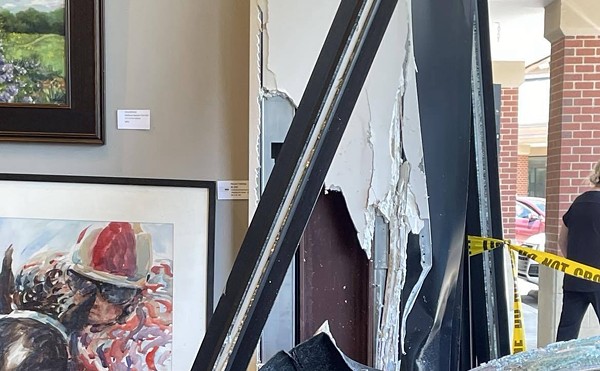LEO welcomes letters that are brief (250 words max) and thoughtful. Ad hominem attacks will be ignored, and we need your name and a daytime phone number. Send snail mail to EROSIA, 640 S. Fourth St., Louisville, Ky. 40202. Fax to 895-9779 or e-mail to [email protected]. We may edit for length, grammar and clarity.
Correction
Because of an editing error, the directors for CenterStage’s “Parade” were misidentified in last week’s issue. The artistic director was John Leffert, and the musical director was Justin Hornback.
Where’s the Progressive Voice?
For those of you who read Stephen George’s article “What if No One Voted” in the Oct. 24 LEO, I want to reference the line where Stephen asks the question: “Does this appear to be a functioning democracy?” By reading the rest of the article or just by looking at the two gubernatorial candidates, any person of minimal social conscious would answer with an emphatic NO.
On both a state and federal level, the large majority of people in this country either votes from a “lesser-of-two-evils” model, or don’t vote at all due to a lack of viable representation. That is simply ridiculous, considering these people make decisions that affect our lives, our children’s lives and potentially the lives of everyone else on the planet. Where are the politicians who truly reflect our values, especially those of a progressive voice? Answer: They are either too broke to compete in any sort of organized campaign, or they become politically assassinated. Or scariest of all, maybe they just don’t exist. In my mind, the principle of the protest non-vote is much more valid than the worthlessness of a vote that acquiesces to a “lesser evil” in order to fulfill the illusion of democracy.
It’s 2007, and American democracy is as oxymoronic as Biggie Smalls (RIP). If you (did) vote, my advice (was) to make an actual choice and vote for someone who truly represents your political will. Maybe it (was) Beshear, maybe Fletcher, or maybe Stephen Colbert, or your neighbor. Take it from a guy who is already campaigning for Marx/Engels in 2008.
Joshua Jennings, Louisville
Hooked on Phonics?
Attn: Mat Herron:
I want to thank you for helping me teach my daughter the correct use of the words “Me,” “Myself” and “I.”
I started to read your article (LEO, Oct. 24) entitled “Food For Thought” when I noticed in the opening sentence you spoke Tarzanian. Maybe it was Tontonian. I know, it was Frankensteinish! Well, whichever language it was, it sure wasn’t English. Your statement read, “A week or so ago, me and some pals were watching some NFL …”
I asked my 8-year-old daughter to read that sentence and asked her if it was correct to say “me and some pals were watching” or “some pals and I were watching.” She was confused at first. I then asked her which was correct: “me was watching” or “I was watching.” She laughed when I said “me was watching.” I asked her why she laughed. She said it was because “me was watching” sounds as if a caveman was speaking. I told her it also sounds like when Tarzan would say, “You Jane, me Tarzan.” Tonto and Frankenstein also spoke in this manner.
All right, what does my letter to you accomplish? Probably, absolutely nothing. I apologize for any sarcasm or criticism, but I just wanted to point out that English teachers are paid to teach the English language while we’re in school. It has become practically accepted to use such grammar as “me and her” or “him and me” rather than “she and I” or “he and I.”
I realize you’re a music editor, not an English professor, and I realize I may be too anal to even raise this issue, but I just wanted express my thoughts.
Ralph Godinez, Louisville
Go Green for the Blues
As Joe Phelps so aptly put it (LEO, Oct. 24), we need more “unum” and less “pluribus” nowadays. I agree. This issue runs back and forth through my mind from time to time, too.
Sometimes it seems like we’ve gotten pretty darned self-centered. There’s much too much stuff in our lives and we care more about these things than people. Maybe we need another Great Depression to help us get a better grip on what really matters. That’s what I think on bad days, anyway.
On better days, I believe the environmental issues will bring us together eventually. Everyone seems to know something about energy conservation, clean air, clean water, soil conservation, pollution abatement, endangered species and climate change. Opinion polls say almost all of us think of ourselves as environmentalists. Let’s make that a reality.
Tom Louderback, Louisville
Humana Allegations Rebutted
In an internal Humana memo, leaked to LEO (July 18 issue), it was alleged that Dr. Linda Peeno, a former contractor for Humana, made statements “proven false” in testimony at Congressional Hearings on HMOs in 1996. Dr. Peeno has provided the context for her statements in several places.
In a clip of Congressional testimony included in the documentary “Sicko,” Dr. Peeno cites the case of a man denied a heart transplant by Humana (they state employer exclusion). Humana’s emphasis on its contractual right to deny the transplant raises some questions. How did he go through the transplant evaluation and listing process without being informed that he didn’t have coverage for a transplant? Why was his coverage ended the year of the denial of the transplant? As a physician, Dr. Peeno certainly realized that the denial of a transplant sentenced this man to a miserable death whether he lived two months or two years.
Another statement in the internal memo alleged as “proven false” concerned a promotion, and is misinformation on the part of Humana. Following her work for Humana, Dr. Peeno received other contract offers in the insurance industry that were quite lucrative and did, in fact, include “a promotion” from medical reviewer to executive physician status.
Labeling statements from an insider as “false” is a red herring tactic to divert public attention from other very serious problems. Private health insurers use a myriad of pre-existing conditions to prevent millions of Americans from qualifying for health insurance because they are considered by the industry to be high risks for future claims. Millions of other Americans (especially young workers) who qualify for private insurance can’t afford the rising premiums — 75 percent of the uninsured hold jobs. In short, private health insurance is biased to favor “the healthier and the wealthier.” These and other problems, such as the containment of inflated costs of healthcare services, require an honest, open-minded, informed debate to reverse the healthcare crisis in this country.
Ruth McDonald, Louisville





